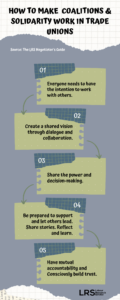To create coalitions at a local level, trade unions can work in a collective with representatives from the community and with women’s organisations, state institutions, faith-based organisations, sports organisations, school governing bodies and/or traditional healers, among others.
Everyone who joins such a collective should have a shared understanding of what they are trying to achieve. For example, people can come together to reduce the level of gender-based violence in schools. Organisations might come together to develop strategies to keep workers healthy and safe in the workplace during the COVID-19 pandemic.
The following are some of the key actions that can create solidarity and make coalitions work.
1. Everyone needs to have the intention to work with others
The union has an intention to bring together all the individuals and organisations that care about addressing a challenge, with the aim of creating relationships of trust and opportunities to experiment with approaches to addressing that challenge. This might involve the coming together of public sector unions, private-sector unions, formations that organise workers in the extended public works programme and civil society and community-based groups – all with the intention of, for example, addressing the challenge of violence in the workplace.
2. Create a shared vision through dialogue and collaboration
The groups and organisations participating in the coalition bring different perspectives and ideas for action to the table and, instead of working individually, a common agenda is created where everyone feels committed and passionate about working towards the shared vision.
3. Share the power and decision-making
For unions, sitting around a table is more likely to be associated with bargaining; a give and take with a focus on who holds power. Solidarity is about shared power – this is an important starting point for solidarity and coalition building. We are very familiar with organisational rivalries and how the competition for power and status can stand in the way of creating solidarity. Smaller and more poorly funded community organisations often resent and fear domination by financially powerful unions. Sharing the decision-making table is a central principle in coalition-building. This way, everyone has an opportunity to be heard – an important shift from having to fight to be heard. This opens the space for everyone meeting around the table to offer resources, actions and commitment at both an individual and organisational level, regardless of the organisational membership size.
4. Be prepared to support and let others lead
As with all coalitions, there is a coordination role. Even though the unions can be institutionally stronger than many other organisations in a coalition, unions do not automatically have to take on the coordination role and can play more of a supportive than leading role. In other contexts, it might be more appropriate or opportune for the union representatives to take on the coordination function while keeping in mind the importance of harnessing the diversity of everyone participating as they contribute to a common agenda.
5. Mutual accountability based on commitment
Collective impact does not have formal mandating as central to the process. Because of this, unions that create or participate in coalitions might struggle to work in a manner that seems to be governed and without clear individual accountability. In coalition building, participants bring their organisational vision and individual passion to the table. No one is asked to vote or commit to decisions that might be contrary to their organisational mission. Everyone participating in the initiative has mutual accountability based on the commitments that they have voluntarily made.
6. Consciously build trust
Accountability can be created through trust. For this to happen, it is important to create honest and supportive interpersonal and inter-organisational relationships. Part of the business of any coalition meeting or gathering is a check-in on how people are feeling and facilitating physical exercises that help deal with trauma and stress. These processes have equal importance to that of discussions on theory or actions.
7. Create a space to share stories
We can create spaces where members of organisations come and feel safe to tell their stories. Stories are incredibly powerful and allow people to connect to one another and to other members’ purposes at both the heart and head levels. The process of storytelling helps people to understand one another in new and different ways. After sharing their story, the trade unionist is no longer merely seen as a worker or a union representative – their story offers a window into their life and the other roles they play (they might be a father, brother, mother, partner, community member, etc). Storytelling brings to the fore the layered and multiple identities of those participating and creates fertile ground for a connection most central to creating solidarity.
8. Create the time to reflect and learn
Coalition building takes time, and ongoing communication, reflection and learning are important for success. Coalition meetings do not follow traditional meeting protocols and are more like places for friends to meet. Special attention is placed on creating a warm and friendly environment. Innovative popular education methods, like small group discussions, storytelling, structured conversations, and work with drawings, are used to create safe and engaging spaces.
View PDF version of this article.







